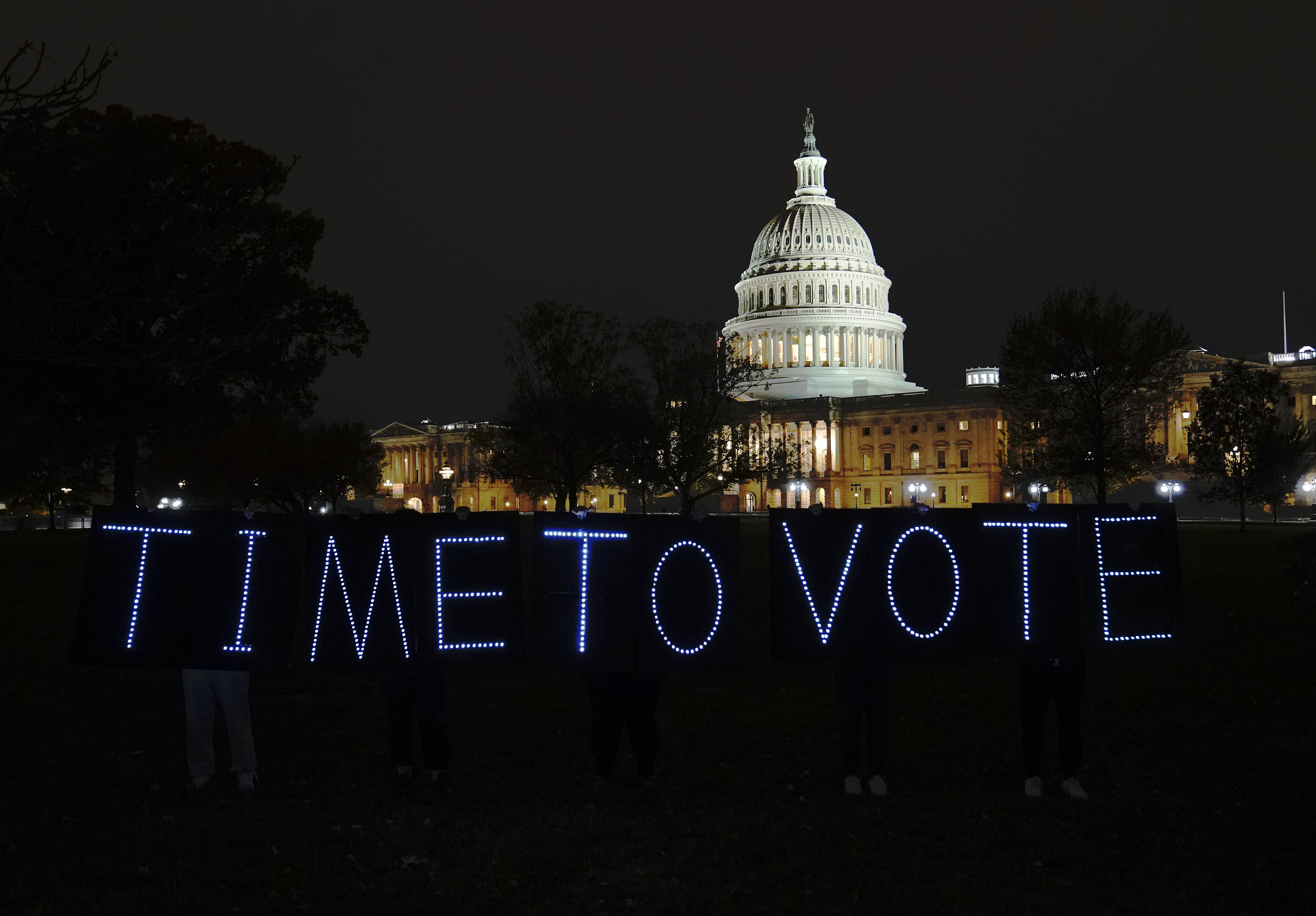
Global Public Opinion in an Era of Democratic Anxiety
As democratic nations have wrestled with economic, social and geopolitical upheaval in recent years, the future of liberal democracy has come into question. In countries across the globe, democratic norms and civil liberties have deteriorated, while populists have enjoyed surprising success at the ballot box. Newly democratic nations have struggled, while more-established, once self-assured democracies have stumbled, exposing long-simmering weaknesses in their social fabrics and institutional designs.
These trends have been well-documented by organizations such as the Economist Intelligence Unit, Freedom House, International IDEA and the Varieties of Democracy project (V-Dem), which measure and track the quality of democracy around the world. Public opinion researchers have also focused on these issues by examining how citizens think about democracy and its alternatives. At Pew Research Center, we’ve applied a comparative, cross-national lens to explore global trends in attitudes toward political representation and individual rights.
This exploration of how people view democracy is based on global public opinion data from surveys conducted by Pew Research Center between 2015 and 2021. Links to the original sources of data – including the methodologies of individual surveys and the specific questions asked – are included wherever possible.
Our international surveys reveal four key insights into how citizens think about democratic governance: For many, democracy is not delivering; people like democracy, but their commitment to it is often not very strong; political and social divisions are amplifying the challenges of contemporary democracy; and people want a stronger public voice in politics and policymaking.
Related (February 2024): Representative Democracy Remains a Popular Ideal, but People Around the World Are Critical of How It’s Working
For many, democracy is not delivering
In part, the current moment of anxiety about liberal democracy is linked to frustration with how democratic societies are functioning. Pew Research Center surveys have consistently found large shares of the public in many countries saying they are dissatisfied with the way their democracy is working. And for many, this dissatisfaction is leading to a desire for political change. A median of 56% across 17 advanced economies surveyed in 2021 say their political system needs major changes or needs to be completely reformed. Roughly two-thirds or more express this opinion in Italy, Spain, the U.S., South Korea, Greece, France, Belgium and Japan.
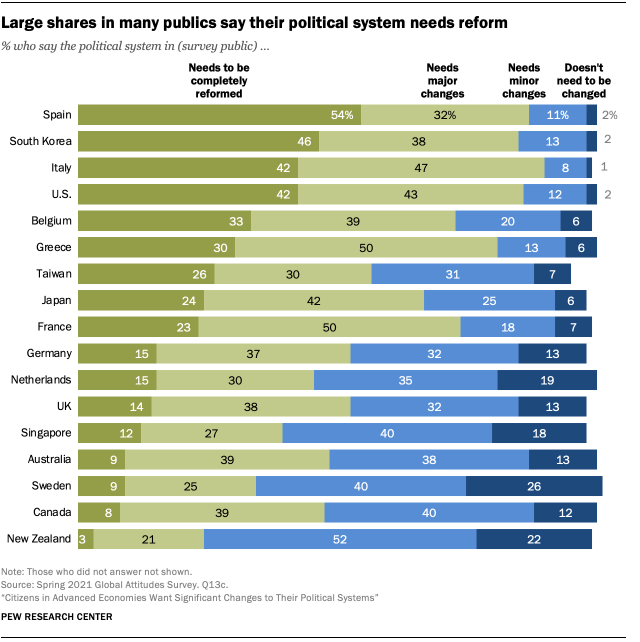
Even where the demand for significant political reform is relatively low, substantial minorities want at least minor changes. In all of the publics surveyed, fewer than three-in-ten say the political system should not be changed at all.
However, there is widespread skepticism about the prospect for change. In eight of the 17 publics, roughly half or more of those polled say the political system needs major changes or a complete overhaul and say they have little or no confidence the system can be changed effectively.
This discontent and disillusionment with the political status quo is tied to many factors, including economic performance, governmental competence and the overall fairness of the political and economic system. Our research over time has shown that when people think their countries are performing poorly on these dimensions, confidence in democracy often slips.
Over the past decade and a half, people around the world have experienced a global financial crisis and more recently a pandemic-driven global downturn. Many have grown pessimistic about the long-term economic future, and our data has illustrated how economic pessimism feeds dissatisfaction with the way democracy is working and weakens commitment to democratic values.
In 2019, we analyzed data from 27 countries to better understand what was driving dissatisfaction with the way democracy is working. We found that the strongest predictor of being dissatisfied was being unhappy with the current state of the national economy. Another significant predictor was how someone feels about economic opportunity. People who said the statement “most people have a good chance to improve their standard of living” did not describe their country well were more likely to be dissatisfied with the way democracy is functioning.
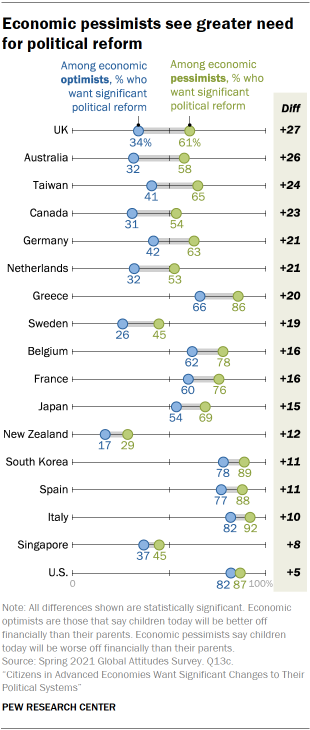
The economic prospects for the next generation also matter. In the survey we conducted across 17 advanced economies in spring 2021, dissatisfaction with the way democracy is working was much more common among people who expect that when children in their country today grow up, they will be worse off financially than their parents. The economic pessimists are also especially likely to think their country’s political system needs major changes or needs to be completely reformed. For example, in the United Kingdom, 61% of respondents who are pessimistic about the next generation’s financial prospects think their country needs significant political reform, compared with just 34% among those who are optimistic that the next generation will do better financially than their parents.
The same survey highlighted the impact the COVID-19 pandemic has had on attitudes toward democracy. People who believe their country is doing a poor job of dealing with the pandemic are consistently more likely to say they are dissatisfied with the way their democracy is working and that they want significant changes to the political system. For instance, 73% of Germans who feel their country is handling the crisis poorly say they believe their political system needs major changes or should be completely overhauled, while just 32% of those who think the country is handling it well express this view.
Beyond the state of economy and public health, opinions about whether countries are living up to basic principles of fairness and justice affect how people feel about the political system. Are political elites, for example, able to manipulate the system to their own advantage? In many countries, large shares of the public say yes. Across 27 nations we polled in 2018, a median of 54% said that most politicians in their country are corrupt. This sentiment was especially high in Greece (89%) and Russia (82%). When we asked Americans a similar question in the fall of 2020, two-thirds said most politicians are corrupt.
Perceptions of fairness, or unfairness, in the judicial system also shape how people feel about their democracy. In our 2018 survey, for example, 68% of Hungarians who felt the court system in their country did not treat everyone fairly were dissatisfied with democracy. Only 32% of those who said they had a fair judiciary were similarly dissatisfied.
Just as people want their individual rights respected within the judicial system, they want their fundamental rights respected in the arena of public debate. In our 2018 international survey, people mostly said they had freedom of speech in their country; however, those who said they did not have it were significantly more likely to be unhappy with the way their democracy is working.
Related (March 2024): How People in 24 Countries Think Democracy Can Improve
Mixed assessments three decades after the fall of the Berlin Wall
To mark the 30th anniversary of the collapse of communism and the fall of the Berlin Wall, Pew Research Center conducted a survey that highlighted the gap between what citizens want from democracy and what they actually see happening in their countries. It found that democracy is popular today in Central and Eastern European nations that for decades had to endure its main competitor throughout the Cold War, Soviet-style communism. But citizens in these nations nonetheless had strong criticisms and deep disappointments about the post-communist era.
When we asked people in nine former Eastern Bloc nations whether they approve of the shift their countries made to multiparty democracy, they largely said yes, although significant minorities said no, including more than one-third in Bulgaria and Ukraine. Majorities of Bulgarians and Ukrainians said the economic situation for most people was actually better under communism. And even in countries with much more positive assessments of the transition to democracy and capitalism, there are concerns about certain impacts of this transition. Roughly four-in-ten or more across these nations say the changes since the fall of communism have had a negative influence on health care, law and order, and family values.
Many also thought politicians and business people benefited more than ordinary people when their countries moved to a multiparty system and a market economy. A median of 89% said politicians benefited a great deal or a fair amount from the changes in their country, 80% said the same of business people, but only 41% believed ordinary people benefited from these changes.
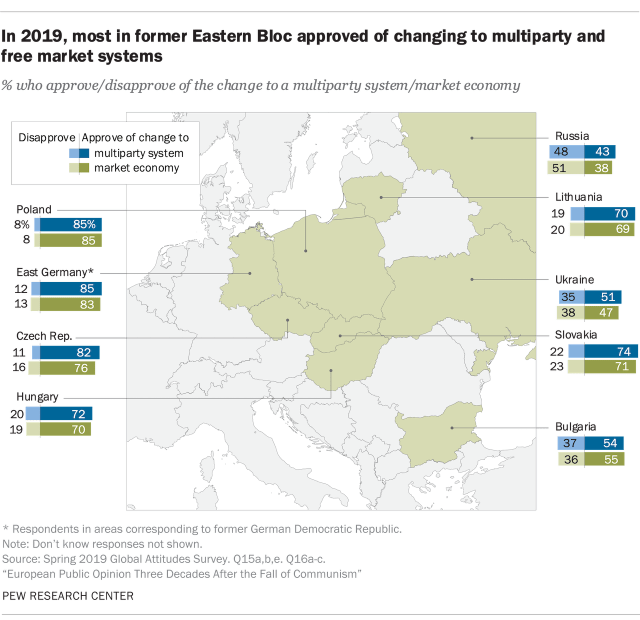
People like democracy, but their commitment to it is often not very strong
Broadly speaking, democracy is a popular idea. When asked about it, people generally say it’s a good way to govern. However, enthusiasm for it as a political system, and for specific democratic rights and institutions, is often tepid. This lack of commitment, which is driven in part by the frustration many feel about the functioning of democracy, may be one reason some would-be autocrats and political entrepreneurs have been able to bend the rules and norms of liberal democracy with relatively few consequences.
As a 2017 Pew Research Center survey demonstrates, people in regions around the world broadly embrace representative democracy. A median of 78% across the 38 nations polled said that “a democratic system where representatives elected by citizens decide what becomes law” is a very or somewhat good way to govern their country. More than half expressed this view in every country polled. However, even at this broad level, enthusiasm for representative democracy was somewhat subdued – a median of only 33% said it is a very good approach to governing.
In addition to representative democracy, the survey found considerable support for direct democracy. Across the 38 countries polled, a median of 66% said “a democratic system where citizens, not elected officials, vote directly on major national issues to decide what becomes law” is a very or somewhat good way to govern their country. As we’ll discuss below, the appeal of direct democracy speaks to the demand many citizens express for more public involvement in politics.
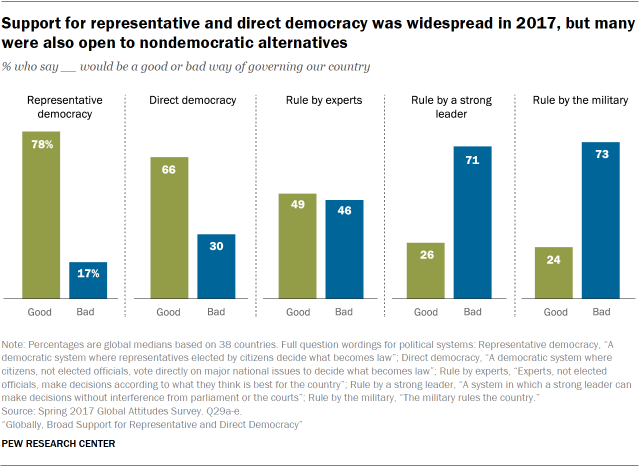
However, the same survey found substantial support for nondemocratic approaches to governing. For example, a median of 49% believed a system in which “experts, not elected officials, make decisions according to what they think is best for the country” would be very or somewhat good.
And while autocracy was less popular, it was embraced by a remarkably large share of the public in many nations. A median of 26% considered “a system in which a strong leader can make decisions without interference from parliament or the courts” a very or somewhat good way to govern.
Even military rule had its supporters. A median of 24% said “a system in which the military rules the country” would be a very or somewhat good system. In five countries – Vietnam, Indonesia, India, South Africa and Nigeria – roughly half or more expressed this opinion, as did at least 40% in another six nations. And higher-income nations weren’t completely immune: 17% in the United States, Italy and France believed military rule could be a good way to run the country. The fact that so many citizens in “consolidated” democracies seemed willing to embrace military rule may seem a striking finding, but it’s largely consistent with what other survey research projects, such as the World Values Survey and the Voter Research Group, have found over time.
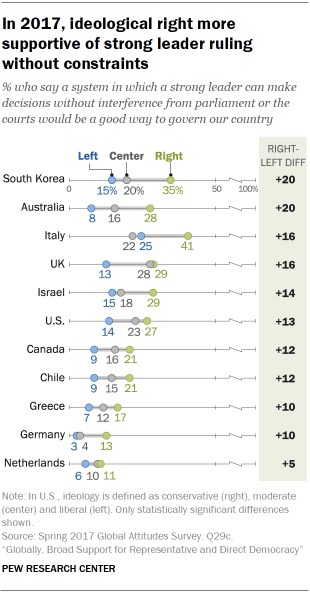
In many countries, people who place themselves on the right of the political spectrum and those with less formal education are more likely to support alternatives to democratic governance. For example, 27% of Americans who identified as conservative thought autocracy would be a good way to govern, compared with 14% who identified as liberal. And 20% of conservatives supported military rule, compared with 12% of liberals. People with lower levels of educational attainment were more likely to consider military rule a good way to govern in 23 countries.
Beyond democracy as a system of government, there is also limited commitment to some specific democratic principles. In a 2019 Pew Research Center survey, most people said nine democratic rights and institutions tested were important. But again, these views varied widely across regions and countries, and in some places, relatively few said it is very important to have them in their country.
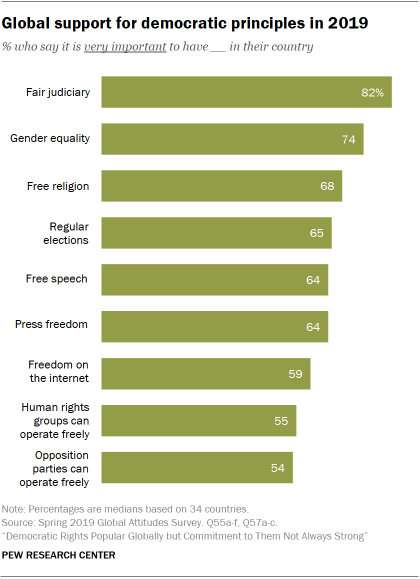
A median of more than 67% across 34 countries rated a fair judicial system, gender equality and freedom of religion as very important. But there was less support for holding regular competitive elections, freedom of speech and press freedom. A median of roughly six-in-ten or fewer said it was very important to have free expression on the internet or to allow human rights groups and opposition parties to operate freely.
Attitudes toward free expression illustrate the challenges of living up to and interpreting democratic principles, even in countries where democratic values are widely endorsed. In a 2015 Pew Research Center survey, a median of 80% across 38 countries believed people should be able to publicly make statements that criticize their government’s policies, but only 35% said the same about statements that are offensive to minority groups or are religiously offensive. And only around a quarter said people should be able to publicly make statements that are sexually explicit.
Political and social divisions are amplifying the challenges of contemporary democracy
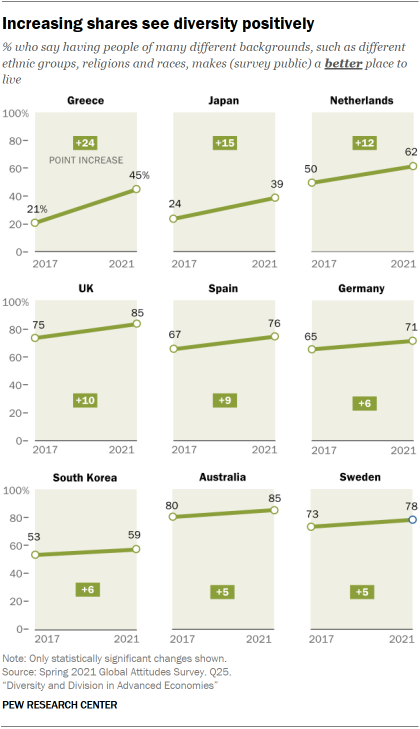
Most modern democracies are increasingly diverse, with globalization, economic restructuring, immigration and urbanization all contributing to social and cultural change. Recent trends from Pew Research Center surveys indicate that in many advanced economies, a growing share of the public views diversity as a strength of their society. In Greece, for example, the share who say having people of many different racial, ethnic and religious backgrounds makes their country a better place to live more than doubled between 2017 and 2021. Over the same period, favorable views of diversity increased by about 10 percentage points or more in Japan, the Netherlands, the UK and Spain. Slightly smaller increases can be seen in Germany, South Korea, Australia and Sweden.
Despite more people welcoming diversity, many continue to see racial and ethnic discrimination as a serious challenge. A median of 67% across the same 17 publics say racial or ethnic discrimination is a problem where they live. Roughly three-in-ten or more in Germany, Spain, the UK, Greece, France, the U.S. and Italy say it is a very serious problem in their country. Younger adults and those on the ideological left are often more convinced on this point. In the U.S., about two-thirds of Americans on the left say racial and ethnic discrimination is a very serious problem in their country, compared with only 19% of Americans on the political right.
U.S. democracy no longer a model
While many people acknowledge racial and ethnic discrimination as a problem in their own country, they often see it as a larger issue in the U.S. A median of 89% across the advanced economies we polled in 2021 – not including the U.S. – say discrimination against groups based on their race or ethnicity is a serious problem in the U.S. This sentiment is strongest in Spain and New Zealand, where roughly two-thirds believe discrimination in the U.S. is a very important issue.
Overall, international publics see major challenges for American politics and society, even at a time when attitudes toward the U.S. have significantly improved following Joe Biden’s victory over Donald Trump in the 2020 presidential election. Across the 16 advanced economies surveyed, a median of just 17% consider American democracy a good model for other countries to follow. A median of 57% think it used to be a good example but has not been in recent years. And around a quarter say the U.S. has never been a good example. The belief that democracy in the U.S. has never been a good model for other nations is especially common among young adults.
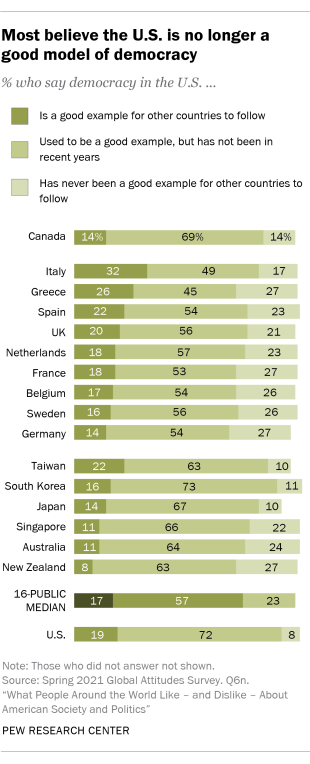
Ideological and partisan differences are also a concern in some advanced economies. This is especially true in the U.S., where 90% say there are strong conflicts between people who support different political parties (the U.S. is tied with South Korea for the highest percentage on the survey). Whether cleavages are based on race, ethnicity or ideology, citizens who worry about these fault lines are often less satisfied with the way democracy is working and more likely to want significant reforms to their political systems.
The global pandemic has, if anything, intensified perceived political and social divisions. Across the 17 advanced economies we surveyed in 2021, a median of 61% say their country is more divided than before the outbreak. Moreover, the share of the public that feels this way has risen substantially as the pandemic has worn on. In the spring of 2020, only months into the crisis, just 29% of Canadians believed they were more divided, but a year later 61% express this view. We also found that people who think their country is more divided today are particularly likely to be dissatisfied with the state of democracy and to want political reform. COVID-19 may have provided a unifying threat in its early days, but the sense of unity has dissipated.
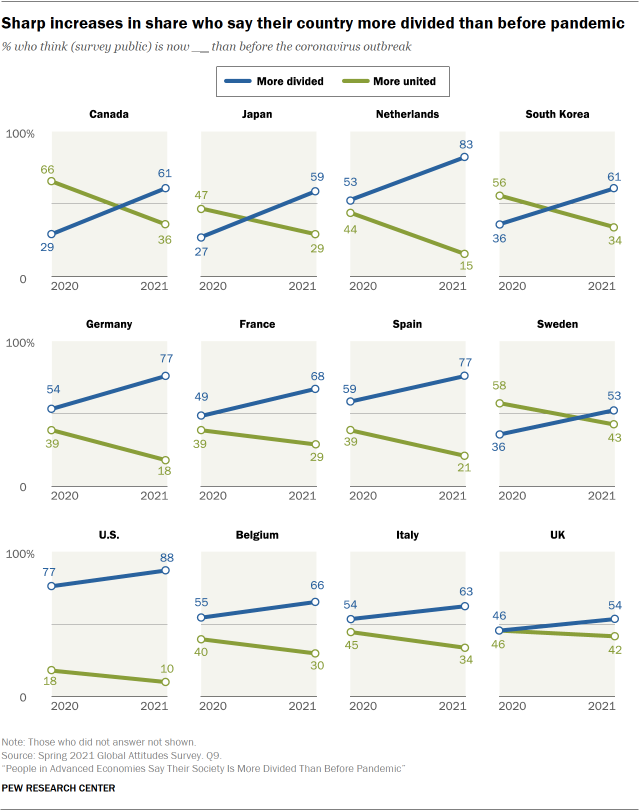
People want a stronger public voice in politics and policymaking
As our surveys have shown, citizens have no shortage of criticisms about the current state of democracy. But they also show that people haven’t given up on democracy – in fact, instead of turning away from it, many want more democracy and a stronger voice in the political system.
Clearly, many are frustrated with the way political representation is working, and they are more than a little frustrated with elected representatives. In a 34-nation Pew Research Center survey in 2019, a median of 64% disagreed with the statement “most elected officials care what people like me think.” While most feel politicians are not listening to them, many also see government working for the few rather than the many. A median of 50% disagreed with the statement “the state is run for the benefit of all the people,” while 49% agreed. And troublingly, in several countries where long-term trends are available, the belief that the state is run for the benefit of everyone in society has decreased significantly over time. For example, 88% of Italians in 2002 said their government was run for the benefit of all, but only 30% held this view in 2019. Over the same nearly two-decade period, the share who feel their state is run for the benefit of everyone also dropped significantly in Germany, Poland, the UK, the U.S., Bulgaria, Turkey, Russia, South Africa, Ukraine and Kenya.
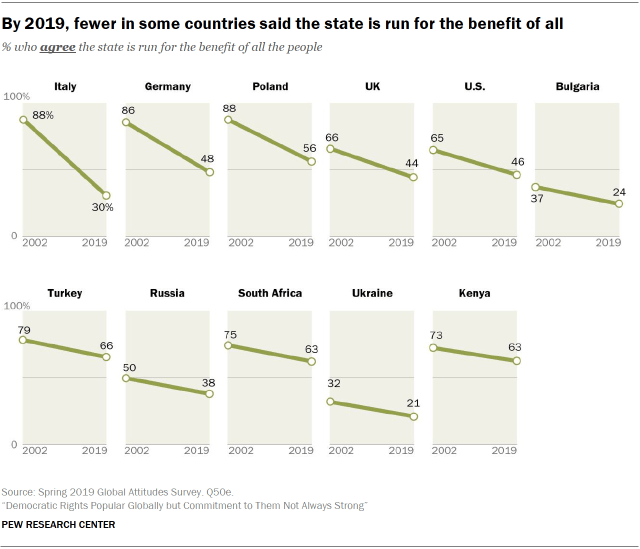
However, all of this frustration has not necessarily led to apathy or helplessness. Despite the disconnect with political elites, many still think they have some agency over what happens in politics. Across 34 nations polled in 2019, a median of 67% agreed that voting gives ordinary people some say about how the government runs things.
But beyond voting, there is also considerable interest in reforms and democratic innovations that could provide citizens with a more active voice in decision-making. As noted above, the idea of direct democracy – where citizens vote directly on what does or does not become law – is popular around the globe. And a fall 2020 survey of France, Germany, the UK and the U.S. found that citizen assemblies, or forums where citizens chosen at random debate issues of national importance and make recommendations about what should be done, were overwhelmingly popular. Around three-quarters or more in each country said it is very or somewhat important for the national government to create citizen assemblies. About four-in-ten considered it very important. As a recent report by the Organization for Economic Cooperation and Development (OECD) highlights, these efforts at deliberative democracy have become increasingly common in nations around the world in recent years. Regardless of what one thinks about direct or deliberative democracy, the fact that so many people seem interested in these ideas speaks to the widespread desire for a more active voice in the political system.
A new analysis of the ways in which people understand and value democracy also highlights the importance of voice. We recently asked people in Australia and the UK to describe what democracy means to them in their own words, and many spoke of the need for citizens to have a voice in government. Many used language describing democracy as a system in which elected officials listen to the public and citizens have a strong influence on decisions. One woman from the UK said that to her, democracy means that “everyone in their country of residence, including myself, deserves our views to be listened to and acted upon.”
Reversing the well-documented negative trends regarding the health of democracy around the world will be difficult and complicated, but our research suggests ordinary citizens want a voice in this discussion, and they believe a healthy democratic system will include a stronger role for them in making decisions about the important issues that shape their lives.
Acknowledgments
This report was written by Richard Wike, Director, Global Attitudes Research, and Janell Fetterolf, Senior Researcher. Shannon Greenwood, Digital Producer, produced the report. Michael Keegan, Senior Information Graphics Designer, produced graphics. Moira Fagan, Research Analyst, and Christine Huang, Research Analyst, checked the report and David Kent, Senior Copy Editor, and Janakee Chavda, Editorial Assistant, copy edited it. Editorial guidance was provided by James Bell, Vice President, Global Strategy, and Hannah Klein, Communications Manager.


